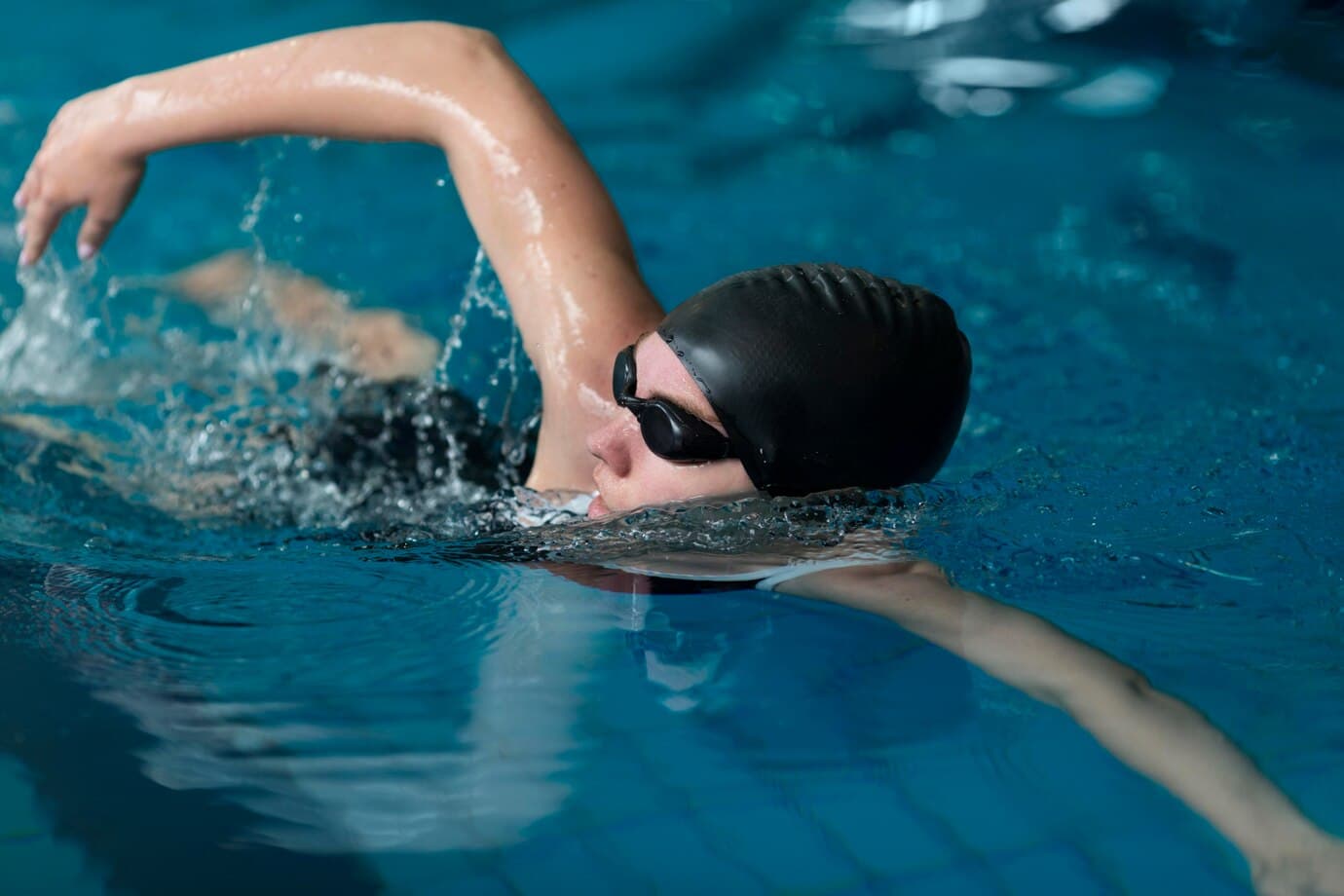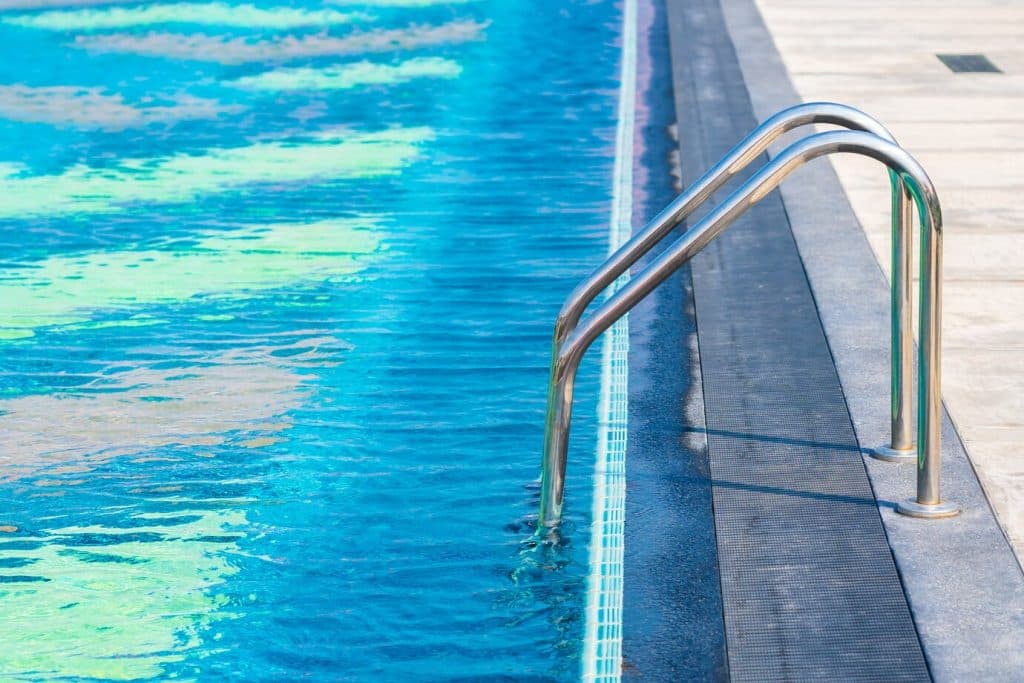Back to blog
💪️ Fitness and Wellness
Dive into Health: What Are the Benefits of Swimming

What Are The Benefits of Swimming for the Body
Swimming for Mental Health
Swimming Tips for Total Wellbeing
Healthy Food Delivery
Swimming for Mental Health
Swimming Tips for Total Wellbeing
Healthy Food Delivery
Swimming is more than just a vacation pastime, it’s an experience! The soothing sensation of water and the feeling of weightlessness make swimming both enjoyable and inviting. Unlike high-impact workouts like HIIT or even strength and resistance training, swimming offers a refreshing change of pace.
It’s a low-impact activity that supports both mental and physical well-being. So, what are the physical and mental benefits of swimming workouts? In this article, we’ll explore the benefits of swimming and water-based exercises, their positive effects on fitness and mental clarity, and their potential in therapeutic settings such as physiotherapy and rehabilitation.
What Are The Benefits of Swimming for the Body
Swimming stands out for its ability to engage every muscle group, making it a well-rounded, full-body workout. One of its major benefits is that it’s gentle on the joints, unlike many other forms of exercise. In fact, it can help relax muscles and ease joint tension, all while providing an effective, calorie-burning workout that supports weight loss and overall fitness. Here are some of its top benefits:
Swimming Benefits for Heart
Every movement in the water, whether it's freestyle or a more advanced stroke like the butterfly, gets your heart pumping and improves cardiovascular health. Regular swimming improves circulation, helps lower blood pressure, and reduces the risk of heart disease, stroke, and diabetes. It’s a powerful and enjoyable way to take care of one of the most vital parts of your body: your heart.
Benefits of Swimming On Muscles

One of the great benefits of swimming for muscles and bones is the natural resistance water provides, it’s like strength training without the weights. As you move through the water, your arms, legs, core, and back muscles all work in harmony, helping to build strength and endurance. Over time, this improved muscle tone supports better posture, balance, and overall physical fitness.
Swimming for Joints
What are the benefits of swimming for joints?
The buoyancy of water can reduce stress on your joints by up to 90% compared to other exercises. This makes swimming an excellent option for those with joint pain, arthritis, or those recovering from injury. It allows for smooth, impact-free movement, minimizing strain and discomfort. Swimming also enhances flexibility and range of motion, particularly in the shoulders, hips, and spine. The gentle stretching and rotation involved help relax tight muscles, improve joint mobility, and ultimately reduce the risk of injury, contributing to better overall mobility.
Improves Sleep Quality
Regular physical activity, including swimming, is linked to better sleep quality. Exercise helps regulate the sleep-wake cycle, which gives you a deeper and more restful sleep. However, it’s best to avoid intense swimming sessions right before bedtime, as they may interfere with your ability to fall asleep.
Benefits of Swimming for Weight Loss
Swimming is an effective way to burn calories and manage your weight. The number of calories burned depends on factors like water depth, swim duration, and body weight. Even light swimming can help burn calories in a healthy way. Plus, building muscle through swimming can give your metabolism a boost over time.
Swimming Benefits for Lungs

Proper breathing techniques in swimming help strengthen the respiratory muscles and increase lung capacity. Similarly, yoga exercises also focus on breathing patterns and control. By learning to control your breathing underwater, you can improve your lungs’ ability to absorb oxygen and deliver it throughout your body. Swimming can be especially beneficial for individuals with asthma or other respiratory issues.
What Are the Benefits of Physiotherapy In A Swimming Pool ?
Swimming is one of the most valuable exercises in physical therapy due to its numerous benefits. It’s known as aquatherapy and it aids in rehabilitating muscles while providing an environment that reduces pressure on bones, muscles, and joints, allowing patients to move more freely and with less pain.
The water's resistance helps strengthen muscles and improve endurance and overall fitness. Additionally, warm water helps with muscle relaxation, eases cramps, and boosts circulation, all of which support the recovery process and reduce swelling. The buoyancy in the water also enhances balance and coordination. Overall, swimming is a safe and effective method for rehabilitation and improving physical function for a variety of conditions.
What Are the Benefits Of Swimming for Women ?
Swimming offers significant benefits for women’s health and well-being throughout all stages of life. For women in their reproductive years, regular swimming can help regulate hormones and may alleviate menstrual symptoms. Its low-impact nature makes it an excellent exercise during pregnancy, offering a gentle way to maintain cardiovascular fitness, control weight gain, and ease issues like back pain and bloating. The buoyancy of the water supports the body, reduces pressure on the joints, and allows for a greater range of motion, which is especially beneficial during the physical changes of pregnancy. Research also suggests that swimming during pregnancy may contribute to shorter labor and a lower risk of complications.
As women enter menopause, swimming continues to be a valuable activity. It helps combat bone loss, an important concern for postmenopausal women by providing weight resistance without stressing the joints. The cardiovascular benefits of swimming are essential for overall health, especially as women age. Additionally, the cooling effect of swimming can help relieve hot flashes, a common symptom of menopause.
In addition to its physical benefits, swimming has a profound effect on mental health. The rhythmic movements and the sensation of being in the water promote mindfulness, reducing stress, anxiety, and symptoms of depression in women of all ages. Swimming also improves mood and sleep quality through the release of endorphins. Social interaction in swimming classes or groups can help fight against feelings of isolation and create a sense of community and support, especially when shared with friends. Regardless of age, swimming offers a full-body workout, engaging major muscle groups to enhance strength, endurance, and flexibility while supporting joint health. This makes swimming a sustainable and enjoyable exercise for long-term well-being.
Swimming Benefits for Men
Swimming offers men an effective way to build strength, improve overall fitness, and support mental clarity, all while being gentle on the joints. It engages the upper, middle, and lower body at once, helping to develop a strong, athletic physique without putting the body under excessive strain. For men dealing with the pressures of daily life, swimming provides a calming escape that helps with the feeling of relaxation and can reduce stress. Regular swimming also supports healthy testosterone levels through full-body movement and can lead to better sleep. It's more than just a workout, it’s a smart, sustainable way for men to stay fit and feel their best.
Swimming for Mental Health

Exercise in general is known to elevate mental health, build self-confidence, improve focus, and enhance self-control. It also supports cognitive function and mental clarity. But swimming offers something extra, a sense of strength, freedom, and even personal growth by helping to overcome fears, such as the fear of water or drowning. For instance, not knowing how to swim can be a limitation for those who enjoy outdoor adventures, especially hiking adventures that involve water crossings. Here are some of swimming’s unique benefits for brain health:
Stress Relief and Mood Enhancement
The rhythmic movements and weightless feeling of being in water create a calming, almost meditative effect. Swimming triggers the release of endorphins, your body’s natural mood changer, which help ease stress, anxiety, and feelings of sadness. The concentration required while swimming also helps quiet racing thoughts and encourages a deeper sense of mental calm.
Improves Focus
The repetitive nature of swimming strokes is great for improving focus and concentration. Coordinating your movements, managing the resistance of the water, and maintaining steady breathing all require mindfulness. This focused state can carry over into daily life, enhancing attention span and cognitive function even outside the pool.
Helps With Self-Esteem and Confidence
Just like with any regular exercise, pushing yourself in swimming, whether it’s completing a set number of laps or learning a new technique, can greatly improve and raise self-esteem and confidence. Overcoming challenges in the water builds a strong sense of achievement, which can carry over into other areas of life and enhance your belief in your own abilities.
Connecting with Nature (Swimming Outdoors)
For those lucky enough to swim in natural settings like lakes or oceans, the experience can be even more rewarding. Being in nature has been shown to lower stress, make your mood so much better, and get you out of your daily routine. The sensory elements of the natural environment, like the sound of water, the feel of a breeze, or the sight of open skies, add an extra layer of calm, making the experience both soothing and meditative.
It Can Increase Awareness
Swimming can serve as a form of moving meditation. Focusing on your breath, the feel of the water against your skin, and the rhythm of your strokes helps bring your attention to the present moment. This heightened awareness can quiet the mind and reduce overthinking, creating a calming, mindful experience.
Swimming Tips for Total Wellbeing

Now that you know what are the benefits of swimming for physical and mental health, here are some simple tips to help you swim safely and make it an enjoyable part of your routine. These do's and don'ts cover everything from timing and clothing to how you listen to your body:
- Listen to your body: if you’re feeling tired or unwell, it’s best to skip your swim. Pushing through when you’re not at your best can lead to injury or burnout.
- Stay consistent: regular sessions, whether a few times a week or daily, bring the most benefits. Short, consistent swims are more effective than occasional long sessions.
- Swim in the morning: starting your day with a swim can increase your energy, sharpen focus, and lift your mood. The cool water also helps you feel refreshed and more awake.
- Midday swims: if your schedule allows, a lunchtime swim can be a great way to break up the day and ease stress. It can also ease the struggle between being productive and feeling lazy!
- Unwind in the evening: a gentle swim in the evening can help you relax and wind down before bed. Just avoid intense workouts too close to bedtime, as they might disrupt your sleep.
- Choose comfortable swimwear: comfort is key. Wear swimwear that lets you move freely and enjoy the water without feeling restricted or self-conscious.
- Use a swim cap: a swim cap can help protect your hair, especially in pools with chlorine, and also reduces drag while swimming.
Tips to Help You Stay Committed
Choose a swimming spot you enjoy and make it your go-to place. Whether it’s a private pool or a natural setting, having a favorite spot makes it easier to stay motivated. Swimming with a friend or family member can also make the experience more fun and help you stay consistent. Here are a few more tips to help you stick with it:
- Avoid peak hours: if you prefer a quiet swim, try to go during off-peak times when the pool is less crowded.
- Fuel your body before and after swimming: good nutrition supports your energy levels and helps your body recover.
- Prioritize carbs: carbohydrates are your body’s main source of fuel. Choose light, easy-to-digest options like a banana, a small bowl of oatmeal with Greek yogurt and berries, or a sports drink.
- Go easy on protein and fat pre-swim: while these are important nutrients, they take longer to digest and can leave you feeling sluggish in the water. Keep them minimal in your pre-swim meal.
- Stay hydrated: drink water before, during, and after your swim. Dehydration can lead to fatigue and affect your performance.
- Pay attention to hunger cues: eat when you’re hungry and stop when you’re full. Even if you’ve burned a lot of calories, avoid overeating.
How to Benefit from Your Water Activity
Learning proper swimming techniques is essential for getting the most out of your workouts and avoiding injury. Don’t rush into it or try to figure everything out on your own, working with a professional, especially in the beginning, can make a big difference. Set realistic goals and work toward them gradually; over time, you’ll notice steady improvements in your strength, endurance, and overall fitness.
Avoid pushing yourself too hard at the start. Think of swimming as a fun journey that helps build both your body and mind. Invest in quality gear, like comfortable swimwear and a good pair of goggles. Having a swimming buddy can also keep you motivated and make the experience more enjoyable. If you can, explore different water environments, outdoor pools, lakes, or oceans—for variety and added enjoyment (always putting safety first, of course).
Healthy Meal Delivery
Committing to a healthy diet will accelerate your progress toward your fitness goals. The Calo app provides delicious, nutritious meals in generous portions, delivered straight to your home, work, or gym, perfect for refueling after your workout. You can also order a tasty, healthy snack to reward yourself for your hard work throughout the day. Take advantage of our first-time discount and activate a monthly subscription. Enjoy meals crafted by nutritionists and connect with our experts to design a personalized monthly plan that aligns with your dietary needs.
FAQ
How many times a week should you swim?
The frequency depends on your fitness level. For optimal benefits, aim to swim two to four times a week.
What are the harmful effects of chlorine in a pool?
Chlorine is commonly used to disinfect pools, but it can dry out the skin and hair and sometimes cause allergies. To minimize these effects, be sure to wash your body thoroughly after swimming.
What are the different types of swimming strokes and styles?
- Freestyle
- Backstroke
- Butterfly
- Breaststroke
Swimming is a truly wonderful sport. Now that you know what are the benefits of swimming and how it can impact your life, you can choose it as your new activity that can change your life for the best. Read more about the benefits of Pilates and the benefits of walking, and more topics related to health and fitness on the Calo blog.








